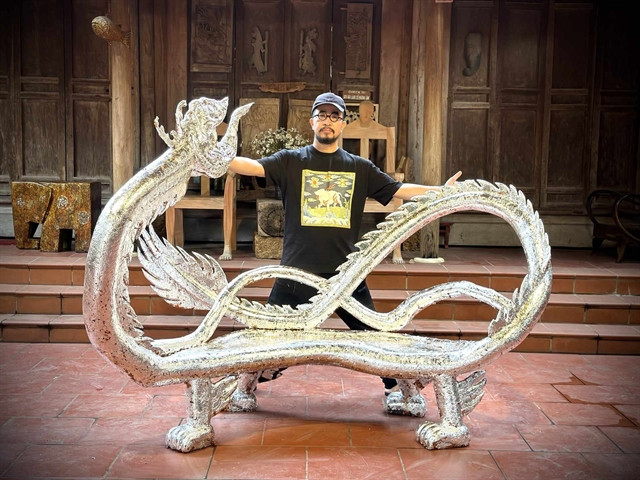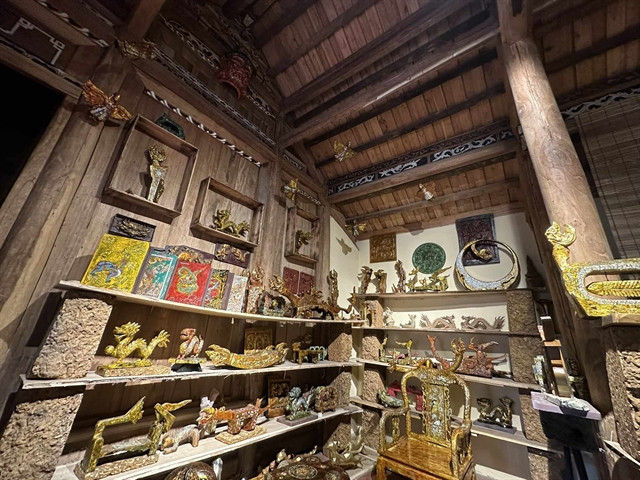 |
| Artisan Nguyễn Tấn Phát is pictured with the dragon-shaped chair, an artwork within his new lacquer collection. Photo courtesy of the artist |
In Vietnamese culture, the image of a dragon holds profound and significant meanings. The sacred symbol. representing strength, power, luck and protection, has become the inspiration for the latest collection by lacquer artisan Nguyễn Tấn Phát from Đường Lâm Ancient Village on the outskirts of Hà Nội.
The collection, entitled Con Rồng Cháu Tiên (Offspring of the Dragon and the Fairy), features 1,000 distinctive items made from various materials – wood, lacquer, ceramics and metal.
“The number of dragon items in the collection, 1,000, corresponds to Việt Nam’s 1,000-year cultural heritage," Phát told Việt Nam News.
"No item in the collection looks alike, which aims to represent the creativity of the Vietnamese people. Meanwhile, its diverse materials reflect the diversity of traditional craftsmanship.”
According to the artisan, the collection is inspired by a legend of the same name that tells about the origin of the Vietnamese people. In the legend, the Vietnamese people are descendants of Lạc Long Quân (a holy dragon) and Âu Cơ (a fairy bird). The term Offspring of the Dragon and the Fairy is commonly used to refer to Vietnamese people in literary works with the intention of promoting unity among different ethnic groups.
“The image of the dragon that is mainly portrayed in the collection is that of the Lý Dynasty (1010-1225) as it represents a pure image of the Vietnamese dragon and fully embodies the characteristics of the Vietnamese people,” he said.
The highlight artwork is a 1,65m-high and 2m-wide chair crafted from lacquer on ebony wood and adorned with 24k gold plating. It took Phát nearly two years to complete the sophisticated chair.
Phát said the legend Lão Long Huấn Tử (Father Dragon Teaches Son) is the idea behind this special dragon chair.
“Many bas-reliefs in Mông Phụ Temple in Đường Lâm Ancient Village depict this concept – the image of a larger dragon at the top turning the head as if talking to a little one below. The motif embodies educational values and the characteristic family affection in the scholarly land of Đường Lâm, which has produced many generations of intellectuals. These bas-reliefs could still be found in the temple today.
“Dragons are mythical creatures, and their image is born out of human aspirations for perfection. In this dragon depiction, I emphasise the reverence for the dragons during the Lý Dynasty, incorporating details such as leaf-shaped tails, inspired by Buddhist symbolism, and the dragon's strong and powerful five-clawed feet.”
The golden dragon is represented using lacquer painting on wood. The image of the fairy is arranged abundantly in the space above the dragon, symbolising the harmony between the dragon and the fairy.
He added: “The legend Offspring of the Dragon and the Fairy helps me complete the dragon-inspired chair, with the dragon's body poised to soar into the air.”
 |
| The dragon-inspired artworks are exhibited at Phát's workshop in Đường Lâm Ancient Village. Photo courtesy of the artist |
The creation of the dragon collection has been implemented since December 2023 and expected to be finished by February 22. The artworks are being crafted and exhibited at the artisan’s workshop that allows visitors to witness the crafting process.
Phát was born in Hà Nội suburb's Sơn Tây Town. As the only lacquer artisan in the town, he has contributed to passing down the craft to the next generation and inspiring young artists in his homeland, as well as creating jobs for dozens of locals.
In 2017, he was among the youngest honoured as a typical “Hà Nội Artisan” by the municipal People's Committee.
The Oriental zodiac animals of recent Lunar New Years have become sources of inspiration for the artisan to launch new lacquer collections. He made 1,010 buffalo statues on the occasion of the 1,010th anniversary of Hà Nội in 2021, 2,022 small tigers to welcome 2022, the Year of the Tiger and 2,023 feline statuettes last year. VNS